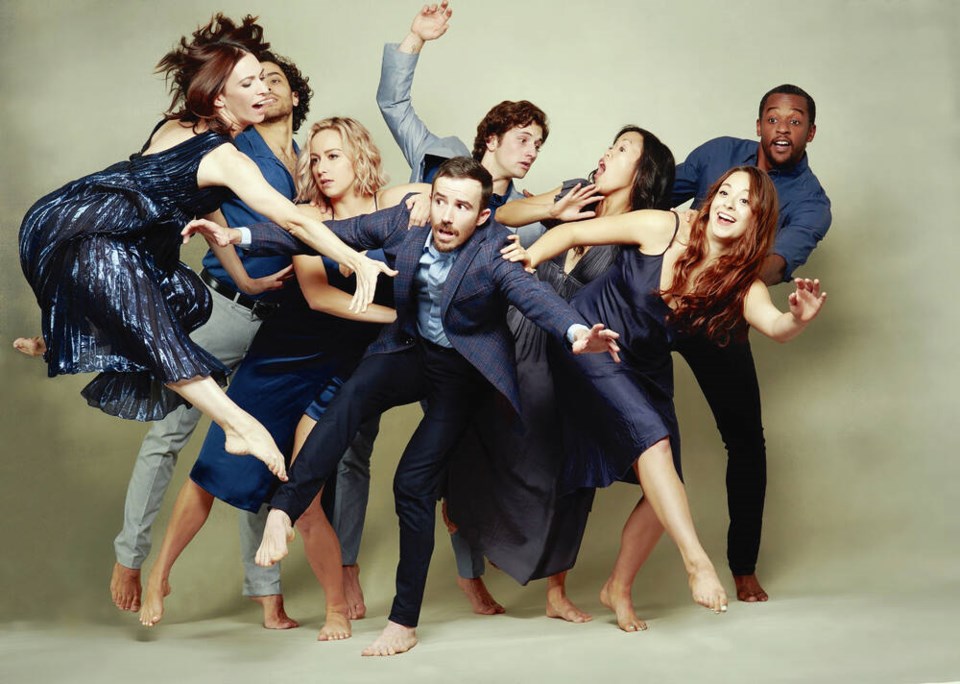BODYTRAFFIC
Where: Royal Theatre, 805 Broughton St.
When: Friday, Feb. 10 and Saturday, Feb. 11, 7:30 p.m.
Tickets: $39-$119 from the Royal McPherson box office (250-386-6121) or rmts.bc.ca
When many who have a working knowledge of Los Angeles think of the city’s defining characteristic, one exhausting element often comes to mind: Traffic.
When asked how that relates to Bodytraffic, the Los Angeles-based contemporary dance company she co-founded with Lillian Barbeito in 2007, artistic director Tina Finkelman Berkett immediately copped to the correlation.
“We thought, ‘What name could we give a dance company that screams Los Angeles?’ And ours does,” she said with a laugh.
The running joke inside the company, however, is the distinct lack of driving required by its staff. Bodytraffic is based in the Koreatown neighbourhood of central Los Angeles, and most of the dancers live quite close to the company’s studio. “It feels like we are in the middle of the melting pot that is L.A., and that’s really fun,” she said.
The neighbourhood, whose majority of residents were born outside of the United States, is a fitting locale for Bodytraffic, Berkett added. “Everyone in the company is either an immigrant or a person of colour, so we really are representative of this city. That’s always what I wanted for this company — for people who to come to a show, they can look on stage and feel like they are well represented.”
Berkett and nine dancers in the company will be in Victoria this weekend for Bodytraffic’s local debut. The pair of mixed repertoire productions under the Dance Victoria banner cover a range of styles and sentiments, showcasing everything from Romanian folk music to routines soundtracked by familiar songs by James Brown, Peggy Lee and Dean Martin.
Though the program has its challenging moments — Alejandro Cerrudo’s PACOPEPEPLUTO features three nearly nude dancers — Berkett wanted to strike a winning balance during her inaugural Victoria appearance. For those in the audience not overly familiar with the form, Bodytraffic performances often use popular music as a gateway into contemporary dance routines, Berkett said.
“There are dance lovers, and we are very lucky to have them, but they are not a big community. I found that people usually come to dance through music, and feel more comfortable with music. So when you put someone in a theatre and play a bunch of Peggy Lee songs, they can’t help but enjoy themselves. And then you’ve hooked them. Then I can pair that with something that is a little more challenging, such as a Russian waltz.
“There might be a few minutes in the program where audiences are a bit challenged, but then we go back and offer them Dean Martin, and they get something they relate to, something that makes their soul feel good.”
That degree of diversity wasn’t always there at the beginning, Berkett said. The company has grown into its reputation for cross-genre repertoire.
“When I started the company, there was more of a personal agenda, as I had moved to L.A. from New York, where I grew up,” Berkett said. “I was only 23 years old and I wanted to fulfil my own personal dreams and goals. But as time went on, I really started to develop a passion for leadership and directorship. A lot has evolved and changed.”
In 2015, Bodytraffic was sent to Israel and Jordan on behalf of the United States government as part of a cross-cultural exchange. Among the dancers who co-founders Barbeito and Berkett worked with were former Israeli soldiers, which had a profound effect on everyone involved. It was during that critical juncture Bodytraffic transitioned into something more meaningful for everyone involved.
“As you get older, you start to become who you were meant to be, or have some clarity,” Berkett said. “Because of all those things, a lot has changed. I didn’t set out initially with that goal, but now it is so clear to me. When you have privilege and access and a platform, you have an obligation to encourage the next generation of dancers.”



